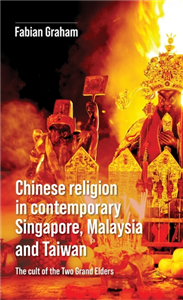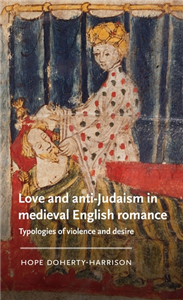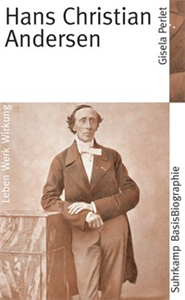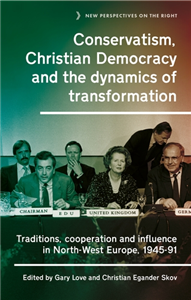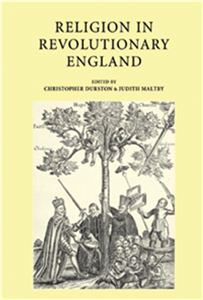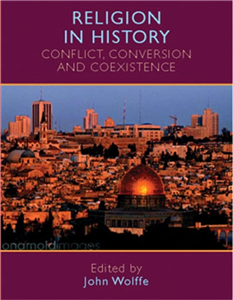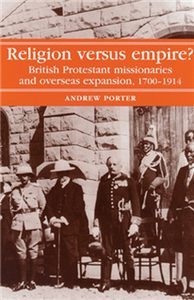Your Search Results
-
Promoted Content2025
Why Be a Christian Today?
by Elisabeth Zoll / Thomas Seiterich (eds.)
The exciting texts and reports by professing Christians offer a fresh perspective for all those who have cultivated a Christian spirituality for many years. However, the book also provides easy access for those who are newly interested in the Christian faith. There are probably as many professions of Christian faith as there are believers in the world. But what do Christians think and how have they been moulded? Elisabeth Zoll and Thomas Seiterich have compiled very personal ideas about the Christian faith in this book. When selecting the contributors, the editors deliberately chose not to include people with church offices or specialised theologians. Irrespective of church policy issues and church scandals, the contributors have provided insights into their path to faith.
-
Promoted ContentHumanities & Social SciencesApril 2022
Chinese religion in contemporary Singapore, Malaysia and Taiwan
The cult of the Two Grand Elders
by Fabian Graham
In Singapore and Malaysia, the inversion of Chinese Underworld traditions has meant that Underworld demons are now amongst the most commonly venerated deities in statue form, channelled through their spirit mediums, tang-ki. The Chinese Underworld and its sub-hells are populated by a bureaucracy drawn from the Buddhist, Taoist and vernacular pantheons. Under the watchful eye of Hell's 'enforcers', the lower echelons of demon soldiers impose post-mortal punishments on the souls of the recently deceased for moral transgressions committed during their prior incarnations. Chinese religion in contemporary Singapore, Malaysia and Taiwan offers an ethnography of contemporary Chinese Underworld traditions, where night-time cemetery rituals assist the souls of the dead, exorcised spirits are imprisoned in Guinness bottles, and malicious foetus ghosts are enlisted to strengthen a temple's spirit army. Understanding the religious divergences between Singapore and Malaysia (and their counterparts in Taiwan) through an analysis of socio-political and historical events, Fabian Graham challenges common assumptions about the nature and scope of Chinese vernacular religious beliefs and practices. Graham's innovative approach to alterity allows the reader to listen to first-person dialogues between the author and channelled Underworld deities. Through its alternative methodological and narrative stance, the book intervenes in debates on the interrelation between sociocultural and spiritual worlds, and promotes the destigmatisation of spirit possession and discarnate phenomena in the future study of mystical and religious traditions.
-
 Trusted Partner
Humanities & Social SciencesNovember 2022
Trusted Partner
Humanities & Social SciencesNovember 2022The religion of Orange politics
by Joseph Webster, Alexander Smith
-
 Trusted Partner
Trusted Partner
-
 Trusted Partner
Literature & Literary StudiesSeptember 2025
Trusted Partner
Literature & Literary StudiesSeptember 2025Love and anti-Judaism in medieval English romance
Typologies of violence and desire
by Hope Doherty-Harrison
Love and anti-Judaism is a new examination of medieval romance for the questions it poses of the most significant events in Christian history. Providing new readings of Sir Gawain and the Green Knight, Sir Orfeo, Sir Gowther and Sir Amadace, the book argues that romance explores depictions of love-and the sacrifices it may necessitate-in the Hebrew Bible, especially where they do not easily fit into interpretations asserting that this history must prefigure Christ and the crucifixion. An examination of anti-Judaism as a discourse of violence and desire that could be turned inwardly to expose the irresolution in Christianity, this book will provoke new investigations into the religious crises of medieval romance.
-
 Trusted Partner
Literature & Literary StudiesJanuary 2004
Trusted Partner
Literature & Literary StudiesJanuary 2004Theatre and religion
Lancastrian Shakespeare
by Richard Dutton, Alison Findlay, Richard Wilson
This important collection of essays focuses on the place of Roman Catholicism in early modern England, bringing new perspectives to bear on whether Shakespeare himself was Catholic. In the Introduction, Richard Wilson reviews the history of the debate over Shakespeare's religion, while Arthur Marotti and Peter Milward offer current perspectives on the subject. Eamon Duffy offers a historian's view of the nature of Elizabethan Catholicism, complemented by Frank Brownlow's study of Elizabeth's most brutal enforcer of religious policy, Richard Topcliffe. Two key Catholic controversialists are addressed by Donna Hamilton (Richard Vestegan) and Jean-Christophe Mayer (Robert Parsons). Robert Miola opens up the neglected field of Jesuit drama in the period, whilst Sonia Fielitz specifically proposes a new, Jesuit source-text for Timon of Athens. Carol Enos (As You Like It), Margaret Jones-Davies (Cymbeline), Gerard Kilroy (Hamlet) and Randall Martin (Henry VI 3) read individual plays in the light of these questions, while Gary Taylor's essay fittingly investigates the possible influence of religious conflicts on the publication of the Shakespeare First Folio. Theatre and religion: Lancastrian Shakespeare as a whole represents a major intervention in this fiercely contested current debate. ;
-
 Trusted Partner
May 2002
Trusted Partner
May 2002Die Religion der Gesellschaft
by Niklas Luhmann, André Kieserling
Die Klassiker der Soziologie hatten die Religionssoziologie als einen zentralen Teil der Gesellschaftstheorie angesehen, und zwar auch und gerade dort, wo ihnen die moderne, angeblich so religionsfern gebaute Gesellschaft vor Augen stand. Der vorliegende Band, an dem Niklas Luhmann bis kurz vor seinem Tod gearbeitet hat, erneuert diesen Anspruch, indem er die Religion als autonomes Kommunikationssystem innerhalb der modernen Gesellschaft beschreibt.
-
 Trusted Partner
Business, Economics & LawFebruary 2009
Trusted Partner
Business, Economics & LawFebruary 2009Christianity and democratisation
From pious subjects to critical participants
by John Anderson
This book examines the contribution of different Christian traditions to the waves of democratisation that have swept various parts of the world in recent decades. It offers a historical overview of Christianity's engagement with the development of democracy, before focusing in detail on the period since the 1970s. Successive chapters deal with: the Roman Catholic conversion to democracy and the contribution of that church to democratisation; the Eastern Orthodox 'hesitation' about democracy; the alleged threat to American democracy posed by the politicisation of conservative Protestantism; and the likely impact on democratic development of the global expansion of Pentecostalism. The author draws out several common themes from the analysis of these case studies, the most important of which is the 'liberal-democracy paradox'. This ensures that there will always be tensions between faiths that proclaim some notion of absolute truth and political orders that are rooted in the idea of compromise, negotiation and bargaining. Written in an accessible style, this book will appeal to students of politics, sociology and religion, and prove useful on a range of advanced undergraduate and postgraduate courses. ;
-
 Trusted Partner
October 2022
Trusted Partner
October 2022Is God Democratic?
On the relationship between democracy and religion
by Otfried Höffe
How much religion can the secular state tolerate? And how much democracy can religion tolerate? Encounters between politics and religion carry a high potential for conflict. How can we handle this? The internationally renowned ethicist and philosopher Otfried Höffe explores these questions in depth in his essay, referring to ideas from antiquity to modernity as he does so. His knowledgeable and fascinating remarks are more relevant than ever in a time in which more and more political conflicts around the world are religiously charged.
-
 Trusted Partner
Trusted Partner
-
 Trusted Partner
Humanities & Social SciencesJune 2025
Trusted Partner
Humanities & Social SciencesJune 2025Faith, folk and the far right
Racist and anti-racist Heathenry and Occultism in Britain
by Dominic Alessio, Robert J. Wallis
This book offers the first examination of extremist Heathenry and occultism in the UK and how anti-racist Heathens act to counter this discourse. It explores the spectrum of Heathen practice today and the historical origins of racist Heathenry in nineteenth century Germanic romanticism and twentieth century folkish nationalism. Treating each of the three main extremist Heathen organisations, the book extends the analysis to the neo-Nazi occult organization the Order of the Nine Angles (O9A), and the wider racist Heathen cultural scene in Black Metal and Dark Folk music. The authors balance this with discussion of how inclusivist Heathens are countering this discourse, from visible protests at far-right rallies to inter-faith forums and an active presence on social media platforms. The book makes an important contribution to the intersecting fields of new religious movements, nationalist history and racist politics.
-
 Trusted Partner
Humanities & Social SciencesOctober 2020
Trusted Partner
Humanities & Social SciencesOctober 2020Religion, war and Israel’s secular millennials
by Stacey Gutkowski
-
 Trusted Partner
Humanities & Social SciencesJanuary 2013
Trusted Partner
Humanities & Social SciencesJanuary 2013Christian Dualist Heresies in the Byzantine World, c. 650-c. 1450
by Janet Hamilton, Bernard Hamilton
Christian dualism originated in the reign of Constans II (641-68). It was a popular religion, which shared with orthodoxy an acceptance of scriptual authority and apostolic tradition and held a sacramental doctrine of salvation, but understood all these in a radically different way to the Orthodox Church. One of the differences was the strong part demonology played in the belief system. This text traces, through original sources, the origins of dualist Christianity throughout the Byzantine Empire, focusing on the Paulician movement in Armenia and Bogomilism in Bulgaria. It presents not only the theological texts, but puts the movements into their social and political context.
-
 Trusted Partner
March 2005
Trusted Partner
March 2005Hans Christian Andersen
by Gisela Perlet
Der Werdegang Hans Christian Andersens vom armen Schustersohn zum erfolgreichen Schriftsteller mutet wie ein Märchen an. Allerdings bemühte er sich auch nach Kräften, diesen Mythos zu pflegen. Andersens Figuren traten schon zu seinen Lebzeiten ihren Siegeszug durch die Welt an und sind bis heute unvergessen.
-
 Trusted Partner
November 2010
Trusted Partner
November 2010Lebenslust mit Christian Morgenstern
by Christian Morgenstern, Thomas Kluge
Christian Morgenstern wurde am 6. Mai 1871 in München geboren. 1892/93 begann er ein Studium der Rechtswissenschaften an der Universität Breslau, das er bald abbrach. Er zog nach Berlin und war dort als Journalist, Kultur- und Literaturkritiker und Redakteur tätig und veröffentlichte zahlreiche Beiträge und Glossen in Zeitschriften. Sein erster von seinen insgesamt vierzehn Lyrik-Bänden In Phantas Schloß erschien 1895. In der Folgezeit beschäftigte er sich mit der Übersetzung und Herausgabe der Werke von August Strindberg und Henrik Ibsen und schrieb für Max Reinhardts Berliner Kabarett »Schall und Rauch«. Von 1903 bis 1905 war er Redakteur der Zeitschrift »Das Theater« im Verlag von Bruno Cassirer, für den er auch als freier Lektor arbeitete. 1909 schloß sich Morgenstern dem Kreis der antroposophischen Gesellschaft um Rudolf Steiner an. Am 31. März 1914 starb er in Meran / Italien an den Folgen einer Tuberkulose-Erkrankung.
-
 Trusted Partner
Humanities & Social SciencesJuly 2025
Trusted Partner
Humanities & Social SciencesJuly 2025Conservatism, Christian Democracy and the dynamics of transformation
Traditions, cooperation and influence in North-West Europe, 1945-91
by Gary Love, Christian Egander Skov
Conservatism, Christian Democracy, and the Dynamics of Transformation compares the centre-right political traditions of Britain, the Nordic countries, France, West Germany, and Austria and looks for evidence of political cooperation and influence across borders during the period 1945-90. The book explores howa variety of intellectuals, politicians, and political parties transformed their politics in response to major economic, social, and political challenges and seeks to explain why conservatives and Christian democrats came to feel that they belonged to a wider centre-right political family by the end of this period. It also examines why these political traditions found it difficult to cooperate with each other after the Second World War and why they decided to invest more political capital in inter-party relations and wider transnational projects from the 1960s. As the book shows, these developments resulted in two new centre-right internationals: the European Democrat Union and the International Democrat Union.
-
 Trusted Partner
Trusted Partner
-
 Trusted Partner
Humanities & Social SciencesJanuary 2007
Trusted Partner
Humanities & Social SciencesJanuary 2007Religion in Revolutionary England
by Christopher Durston, Judith Maltby
This book offers a collection of essays tightly focused around the issue of religion in England between 1640 and 1660, a time of upheaval and civil war in England. Edited by well-known scholars of the subject, topics include the toleration controversy, women's theological writing, observance of the Lord's Day and prayer books. To aid understanding, the essays are divided into three sections examining theology in revolutionary England, inside and outside the revolutionary National Church and local impacts of religious revolution. Carefully and thoughtfully presented, this book will be of great use for those seeking to better understand the practices and patterns of religious life in England in this important and fascinating period. ;
-
 Trusted Partner
Humanities & Social SciencesNovember 2004
Trusted Partner
Humanities & Social SciencesNovember 2004Religion in history
Conflict, conversion and coexistence
by John Wolffe
This is an integrated collection of essays by leading scholars that looks at issues of conflict, conversion and coexistence in the religious context since the third century. The range of topics explored include paganism and Christianity in the later Roman world, the Crusades, the impact of the Reformation in Britain and Ireland, subsequent Protestant-Catholic conflict, the Hindu Renaissance in nineteenth-century India, the Palestinian-Israeli conflict, Britain in the 1960s, women and the ministry, and Christianity, Judaism and the Holocaust. The book concludes by offering an historical perspective on religion, conflict and coexistence in the world today. Published in association with The Open University, this is a student-friendly and accessible volume on popular subjects within religious history, and it will be of value to students on a range of courses, as well as to a wider readership interested in the historical background to the role of religion in the contemporary world. ;
-
 Trusted Partner
Colonialism & imperialismAugust 2004
Trusted Partner
Colonialism & imperialismAugust 2004Religion Versus Empire?
British Protestant missionaries and overseas expansion, 1700–1914
by Andrew Porter
This is the only book that addresses the relations between religion, Protestant missions, and empire building, linking together all three fields of studyby taking as its starting point the early eighteenth century Anglican initiatives in colonial North America and the Caribbean. It considers how the early societies of the 1790s built on this inheritance, and extended their own interests to the Pacific, India, the Far East, and Africa. Fluctuations in the vigour and commitment of the missions, changing missionary theologies, and the emergence of alternative missionary strategies, are all examined for their impact on imperial expansion. Other themes include the international character of the missionary movement, Christianity's encounter with Islam, and major figures such as David Livingstone, the state and politics, and humanitarianism, all of which are viewed in a fresh light. This monumental study shows that the missionary movement had a far more complex and ambiguous relationship with the Empire than has previously been thought, and will be widely welcomed by students and scholars of imperial history and the history of religion.






